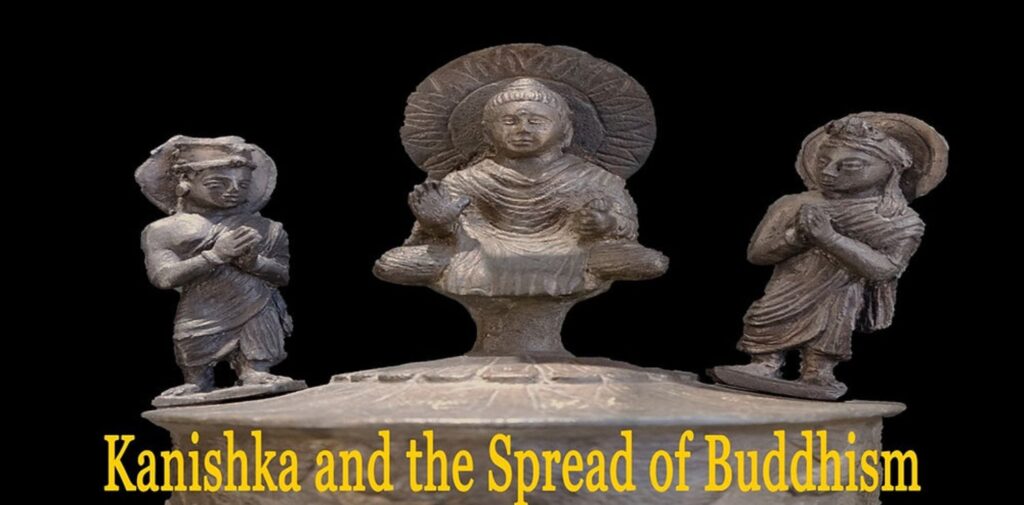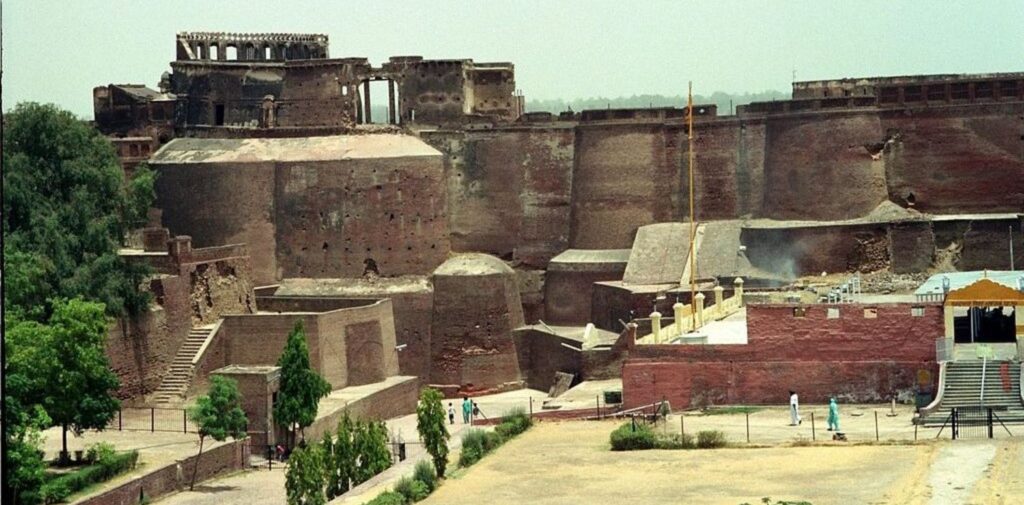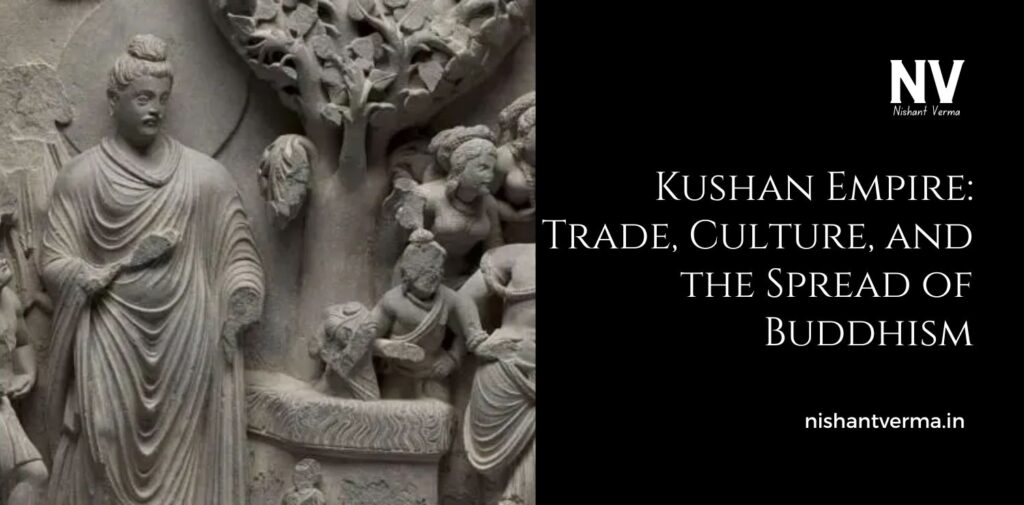A long time ago, in ancient India, there was a mighty empire called the Kushan Empire. The Kushan Empire was important not only because of its power but also because it played a big role in trade, culture, and the spread of Buddhism across many parts of the world. This empire existed between the 1st and 3rd centuries CE, and its rulers helped connect different parts of Asia, making it a very important part of history.
In this article, we will take a simple journey to learn about the Kushan Empire, its trading power, the rich culture it helped create, and how it played an important role in spreading Buddhism far and wide.
The Rise of the Kushan Empire
The Kushan Empire was founded by the Kushans, a group of people who originally came from Central Asia. They were part of a larger group known as the Yuezhi, who were nomadic and moved around looking for better places to live. Over time, the Kushans settled in the regions of northwestern India and parts of Central Asia.
The Kushan rulers were very powerful, and they created an empire that stretched from Afghanistan in the west to northern India in the east, and from China in the north to India’s plains in the south. Their most famous ruler was Kanishka, who expanded the empire to its largest size and made it one of the richest and most powerful empires of its time.

Trade and Commerce: The Kushans as Traders
One of the most important things that made the Kushan Empire successful was trade. The Kushans were excellent traders, and they controlled many important trade routes that connected different parts of Asia. These trade routes were not just local but stretched far and wide, reaching places like China, Rome, and Central Asia.
The Silk Road was one of the most famous trade routes that the Kushans controlled. This was a network of roads that helped traders carry goods like silk, spices, precious stones, gold, and textiles from one part of Asia to another. The Kushans were in a key position along these routes, and they made a lot of money by acting as middlemen in these trades.
Through trade, the Kushans helped bring many ideas, products, and cultures together. For example, Chinese silk came to India through these trade routes, and Indian spices and cotton were sold in Roman markets. The Kushans were not just involved in trading goods, but they also played an important role in bringing together people and cultures from all over Asia.
Cultural Growth: The Kushans as Patrons of Art
The Kushan Empire was not only known for its trade but also for its strong culture. The Kushan rulers were great supporters of art, architecture, and learning. They encouraged artists and craftsmen to create beautiful works of art that are still admired today.
One of the most famous achievements of the Kushan Empire was the development of a special style of sculpture and art. Kushan artists mixed influences from different cultures, including Greek, Persian, and Indian styles, to create unique pieces of art. This style became known as Gandhara art, and it included beautiful sculptures of Buddha, gods, and other figures.
The Kushan Empire also built many important temples and monuments, some of which can still be seen today. Their cities were full of grand buildings, and they built stupas (Buddhist shrines) to honour important religious figures and events.

The Spread of Buddhism: Kanishka’s Role
One of the most significant contributions of the Kushan Empire was its role in the spread of Buddhism. Buddhism is a religion that began in India and was founded by Siddhartha Gautama, known as the Buddha. Over time, Buddhism spread to many parts of Asia, and the Kushan Empire played a big role in making sure it reached faraway places.
Kanishka, the greatest ruler of the Kushan Empire, was a huge supporter of Buddhism. He was known for promoting Buddhist teachings and building many Buddhist temples. Kanishka even called a Buddhist council to discuss and spread the teachings of Buddha. This council helped organize the Buddhist teachings in a way that could be shared with people all over the empire.
Because of Kanishka’s efforts, Buddhism spread from India to Central Asia, China, and even further east to Korea and Japan. His support helped Buddhism become a major religion in Asia. Kanishka’s efforts in spreading Buddhism were so important that he is still remembered as one of the great Buddhist kings in history.
The Role of the Kushan Empire in Connecting Cultures
The Kushan Empire was a bridge between many different cultures and civilizations. It connected the East and the West by linking India, Central Asia, China, and the Roman Empire through trade and culture.
Thanks to the Kushans, people from different parts of the world came into contact with each other. Indian culture influenced Central Asian and Chinese cultures, and at the same time, the Kushans were influenced by Greek, Persian, and other cultures they came into contact with through trade.
The Kushans brought together different religious and philosophical ideas, making their empire a place where people from different backgrounds could learn from one another. This cultural exchange helped to shape the art, religion, and philosophy of many regions.
The Decline of the Kushan Empire
Although the Kushan Empire was very powerful for a few centuries, it eventually began to weaken. This was due to many factors, including invasions from outside forces, changes in trade routes, and internal problems. Over time, the empire split into smaller parts, and by the 3rd century CE, the Kushan Empire came to an end.
Even though the empire no longer existed, the Kushan legacy lived on. The art, culture, and religious influences they helped spread continued to shape Asia for centuries to come.

Legacy of the Kushan Empire
The Kushan Empire left behind a lasting legacy. Their trade networks connected different parts of the world, and they helped spread not only goods but also ideas. The art and culture of the Kushans had a lasting impact on the regions they ruled, and their support of Buddhism helped the religion spread far and wide.
Today, we can still see the influence of the Kushans in many parts of Asia. Their Gandhara art continues to be admired, and the spread of Buddhism that they helped encourage has influenced millions of people around the world.
Conclusion: The Importance of the Kushan Empire
The Kushan Empire was a great empire that played an important role in trade, culture, and the spread of Buddhism. By controlling key trade routes, supporting art and culture, and promoting Buddhism, the Kushans helped shape the history of India and the entire Asian continent.
Though the empire eventually declined, its contributions to world history are still remembered and celebrated today. The Kushan Empire’s efforts in connecting people, spreading ideas, and fostering peace made it one of the most important empires in ancient history.




